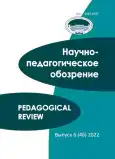In the first decades of Soviet power, the attitude to the problems of the development of education was directly related to the ideological guidelines for the rejection of the previous principles of the organization of education, including the obvious achievements of the pre-revolutionary school. The genesis of the Russian system of teacher education was largely due to the objectives of introducing universal education. At the state level, this problem was identified as early as the end of the 19th century, the decision to introduce universal primary education was made by the State Duma of the Russian Empire of the third convocation, but the implementation of the plan turned out to be possible only in the 1930s. In pre-revolutionary Russia, special pedagogical educational institutions worked in the system of the Ministry of Public Education - teacher’s institutes and seminaries. As a result of the Soviet reorganization of the system of teacher education, they were closed or transformed beyond recognition. The formation of a new educational system took place in the context of the revolution and the Civil War, which left its mark on the entire process, especially in Siberia and the Far East, which in June 1918 were outside the policy zone of the People’s Commissariat of Education. With the establishment of Soviet power in the region, a new wave of reorganization of pedagogical educational institutions began, which coincided with the period of «creative searches» of the People’s Commissariat for Education in matters of the structure of pedagogical education, the image of the Soviet «teacher – social worker», and teaching methods. The search for a new model of teacher training in the Soviet school against the backdrop of increased centralization of education management gradually led to the abandonment of experimental approaches to the organization of education. To a large extent, the experience of professional training of teachers was rethought and taken into account with certain adjustments in the content of education and upbringing of the future Soviet teacher. The program for the introduction of universal education in the USSR was carried out at an accelerated pace and was implemented in a short time, already in 1930–1934. in the USSR, universal compulsory education was introduced in rural areas in the amount of an elementary four-year school, and in cities and workers’ settlements – in the amount of a seven-year school. This required great efforts of the whole society and the state: in each regional center and, if there was such an opportunity, then on the basis of the former teacher’s seminaries and institutes, pedagogical institutes and technical schools, pedagogical courses of various levels and purposes were opened; significant financial and human resources have been allocated to create a network of teacher training institutions; the unification of the system of training of pedagogical personnel and the requirements for the qualification of a teacher was carried out.
 9-17
9-17


 18-27
18-27


 28-38
28-38


 39- 48
39- 48


 49-61
49-61


 62-76
62-76


 77-85
77-85


 86-94
86-94


 95-103
95-103


 104-113
104-113


 114-121
114-121


 122-130
122-130


 131-148
131-148


 149-158
149-158


 159 - 167
159 - 167


 168-180
168-180


 193-205
193-205


 181-192
181-192


 206-214
206-214


 215-217
215-217











